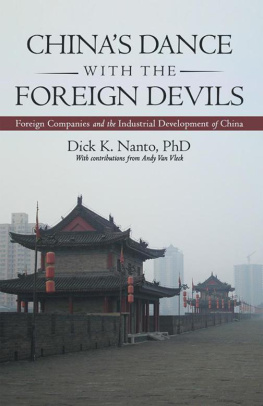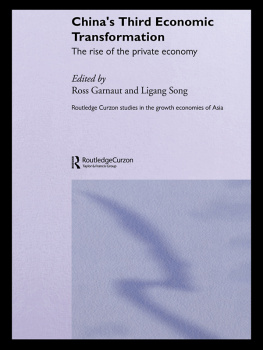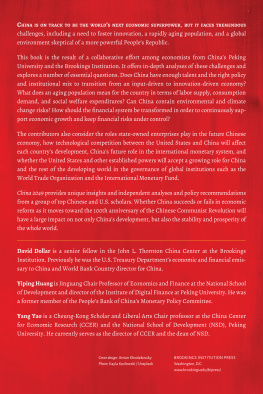ROUTLEDGE LIBRARY EDITIONS: BUSINESS AND ECONOMICS IN ASIA
Volume 23
MANAGEMENT ISSUES IN CHINA: VOLUME I
First published in 1996 by Routledge
This edition first published in 2019
by Routledge
2 Park Square, Milton Park, Abingdon, Oxon OX14 4RN
and by Routledge
52 Vanderbilt Avenue, New York, NY 10017
Routledge is an imprint of the Taylor & Francis Group, an informa business
1996 Selection and editorial matter, David H. Brown and Robin Porter; individual chapters, the contributors
All rights reserved. No part of this book may be reprinted or reproduced or utilised in any form or by any electronic, mechanical, or other means, now known or hereafter invented, including photocopying and recording, or in any information storage or retrieval system, without permission in writing from the publishers.
Trademark notice: Product or corporate names may be trademarks or registered trademarks, and are used only for identification and explanation without intent to infringe.
British Library Cataloguing in Publication Data
A catalogue record for this book is available from the British Library
ISBN: 978-1-138-48274-6 (Set)
ISBN: 978-0-429-42825-8 (Set) (ebk)
ISBN: 978-1-138-36547-6 (Volume 23) (hbk)
ISBN: 978-0-429-43072-5 (Volume 23) (ebk)
Publishers Note
The publisher has gone to great lengths to ensure the quality of this reprint but points out that some imperfections in the original copies may be apparent.
Disclaimer
The publisher has made every effort to trace copyright holders and would welcome correspondence from those they have been unable to trace.
First published 1996
by Routledge
11 New Fetter Lane, London EC4P 4EE
Simultaneously published in the USA and Canada
by Routledge
29 West 35th Street, New York, NY 10001
1996 Selection and editorial matter, David H. Brown and Robin Porter; individual chapters, the contributors
Typeset in Times Ten by Florencetype, Stoodleigh, Devon
Printed and bound in Great Britain by
Clays Ltd, St Ives plc
All rights reserved. No part of this book may be reprinted or reproduced or utilized in any form or by any electronic, mechanical, or other means, now known or hereafter invented, including photocopying and recording, or in any information storage or retrieval system, without permission in writing from the publishers.
British Library Cataloguing in Publication Data
A catalogue record for this book is available from the British Library
Library of Congress Cataloguing in Publication Data
A catalogue record for this book has been requested
ISBN 0-415-13001-8 (hbk)
ISBN 0-415-13002-6 (pbk)
David H. Brown and Robin Porter
It is now fifteen extraordinary years since China embarked on its programme of economic reform. That decision, taken in 1978, represented a sea change in the direction of Chinese society in general and in the role and importance of Chinese managers in particular. First announced by Deng Xiaoping just two years after the death of Mao and the end of the Great Proletarian Cultural Revolution, the new policy of reform undoubtedly had a complex set of motivations behind it. The party needed to engender loyalty in the population following a long period of political instability. There had been an almost complete collapse in the credibility of moral incentives among the younger generation, and a tangible improvement in the standard of life was urgently needed. There was too a desire to make China a great and respected nation through modernization. There was also a growing recognition of the cost in technological progress of international isolation, and before that of wholesale reliance on often obsolete Soviet technology and equipment.
There is a good case for saying that the reform programme was not thought through at the beginning, or even that it has not been thought through in any comprehensive way since. The slogan the four modernizations of industry, agriculture, science and technology and national defence was reminiscent in style of slogans used in the campaigns of the Cultural Revolution, all encompassing, but leaving the detail to be worked out later. The appeal to national sentiment that it implied could elicit loyalty across the spectrum of the party leadership, whereas a set of policy prescriptions could invite factional conflict.
In the event, the new techniques which are at the heart of market reform in China have been introduced unevenly and often quite tentatively in different parts of the country and across different sectors of the economy, sometimes led by local initiative or with the support of only a part of the leadership. Among the milestones have been the re-emergence of private production and free markets in agriculture, beginning in Sichuan in 1979, the implementation of the contract responsibility system in certain industries and the practice of director responsibility in certain factories in the early 1980s. The devolution of authority in the state sector beginning in the mid-1980s was accompanied by the growth of wholly private commercial enterprise.
These developments have occurred within a framework of growing institutional and legal provision for foreign investment, to attract the enabling finance and technology for Chinas economic growth which she could not provide herself. This has included the creation of the Special Economic Zones for trade and investment which began in 1984, the elaboration of a growing body of trade and investment law, the designation of development zones, and even the creation of the Shanghai stock exchange.
All of these developments have been the subject of controversy at the highest levels of the party, and almost all have in consequence suffered some degree of reversal or obstruction in practice. Despite these difficulties the economic outcome is not a matter of dispute. The combination of market, enterprise, legal and fiscal reform had delivered a decade of GDP growth averaging 9 per cent per year. Into the 1990s the early setback resulting from the Tiananmen Square incident of 4 June 1989 was soon overcome. By the end of 1994 annual growth had reached 13 per cent, foreign trade volumes had exceeded US$235 billion and China returned to a trade surplus of US$5 billion. A remarkable 50,000 new foreign projects were approved during 1994 involving a direct investment of US$35 billion, making China the most sought after developing country for foreign investors (China Britain Trade Review, CBTE, London, March 1995). But such conspicuous success has brought a litany of taxing economic and social problems. Inflation at 24 per cent in 1994 and corruption continue to be the major concerns and were central themes of the 1995 National Peoples Congress. Urban unemployment standing at 5 million at the end of 1994 and an estimated further 30 million under-used workers pose growing difficulties for the state and for enterprise managers. Finally, excessive fixed asset investments, poor organization structures in industry and the ailing state owned enterprises with over a third of the main 100,000 organizations in receipt of subsidies exemplify further the mistakes made and the problems yet to be tackled. (












